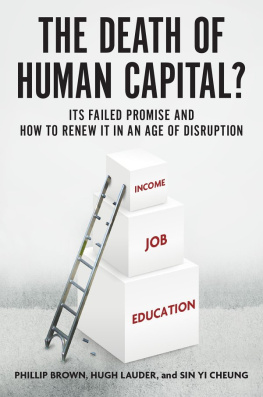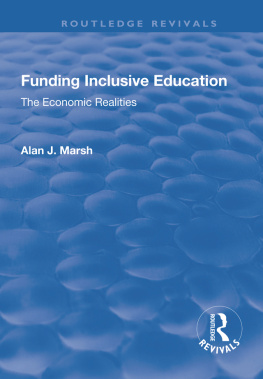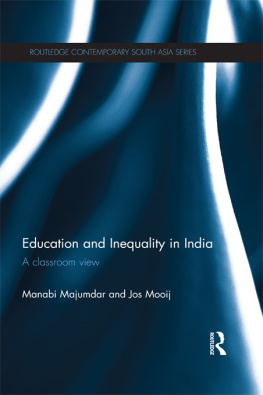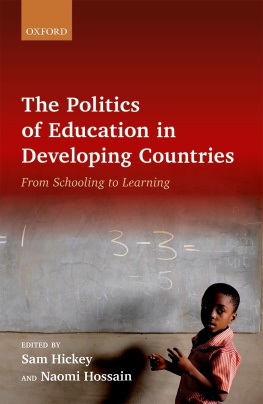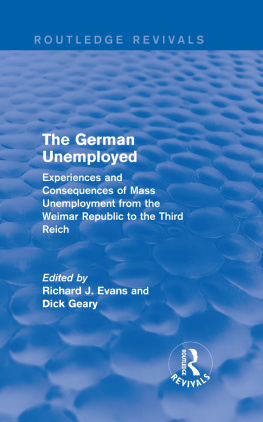Routledge Revivals
Schooling Ordinary Kids
Originally published 1987 Schooling Ordinary Kids looks at the invisible majority of ordinary working-class pupils. The book explains why these pupils are now at the centre of a major educational crisis surrounding the soaring rates of youth unemployment. The book is a timely examination of educational inequalities, unemployment, and the new vocationalism. Drawing extensively on the study of schools in the urban centre of South Wales the book highlights the need for an alternative politics of education, if we were to meet the educational challenge of the late-twentieth century. The new vocationalism is revealed here as a policy for inequality both politically and in the classroom.
Schooling Ordinary Kids
Inequality, Unemployment and the New
Vocationalism
by Phillip Brown
First published in 1987
by Tavistock Publications
This edition first published in 2018 by Routledge
2 Park Square, Milton Park, Abingdon, Oxon, OX14 4RN
and by Routledge
711 Third Avenue, New York, NY 10017
Routledge is an imprint of the Taylor & Francis Group, an informa business
1987 Phillip Brown
All rights reserved. No part of this book may be reprinted or reproduced or utilised in any form or by any electronic, mechanical, or other means, now known or hereafter invented, including photocopying and recording, or in any information storage or retrieval system, without permission in writing from the publishers.
Publishers Note
The publisher has gone to great lengths to ensure the quality of this reprint but points out that some imperfections in the original copies may be apparent.
Disclaimer
The publisher has made every effort to trace copyright holders and welcomes correspondence from those they have been unable to contact.
ISBN 13: 978-1-138-54205-1 (hbk)
ISBN 13: 978-1-351-00972-0 (ebk)
Schooling
Ordinary Kids
Schooling
Ordinary Kids
Inequality, unemployment,
and the new vocationalism
PHILLIP BROWN
First published in 1987 by
Tavistock Publications
11 New Fetter Lane, London EC4P 4EE
Published in the USA by
Tavistock Publications
in association with Methuen, Inc.
29 West 35th Street, New York NY 10001
1987 Phillip Brown
Typeset by Keyset Composition, Colchester
All rights reserved. No part of this book may be reprinted or reproduced or utilized in any form or by any electronic, mechanical or other means, now known or hereafter invented, including photocopying and recording, or in any information storage or retrieval system, without permission in writing from the publishers.
British Library Cataloguing in Publication Data
Brown, Phillip
Schooling ordinary kids: inequality, unemployment and the new vocationalism
1. EducationSocial aspectsGreat Britain
2. Education and StateGreat Britain
I. Title
370.190941LC191.8.G7
ISBN 0-422-61490-4
For my parents
Ted and Lee Brown
Contents
This book is based on my PhD thesis completed at the Department of Sociology and Anthropology, University College, Swansea. I am particularly grateful to my supervisor John Parker for his encouragement and guidance. I would also like to express my thanks to a number of people who have helped in different ways. They are: Betty Arnold, David Ashton, Shane Blackman, Ralph Fevre, Herman Gilligan, Richard Jenkins, Hugh Lauder, Graham Lowe, Mike Nellis, Karen OConnell, Teresa Rees, Richard Startup, Chris Stray, Angela Vagnarelli, David Webster, and Bill Williams. However, my greatest debt is to Chris Harris who is both an excellent sociologist and a valued friend.
Thanks also to the pupils, staff, and careers officers from Middleport, without their co-operation this study would obviously have been impossible; and to the person who has had to suffer most, but who has constantly offered support and encouragement, a big thank you to Liz.
In post-war Britain there has always been a minority of working-class pupils who appeared to accept the school, usually because they believed that by arming themselves with enough qualifications to compete for middle-class jobs, they could get out of their class of origin. Another minority have rejected the school as boring, irrelevant, and frequently repressive. This book, however, is about the invisible majority of ordinary working-class pupils (Kahl 1961; Jenkins 1983) who neither left their names engraved on the schools honours boards, nor gouged them into the top of classroom desks. It explains why these ordinary kids did not conform with the school ethos but were nevertheless willing to make an effort, and why they are now at the centre of a major educational crisis.
This crisis is closely connected to broader social and economic changes which have taken place outside the school over the last decade. Britains economy has been seriously affected by world recession and much of the countrys manufacturing industries languish in the shadow of international competition. There have been mass redundancies and unemployment on a scale which even at the time of Callaghans great debate on education in 1976, were unthinkable. We have also witnessed the rapid expansion of the Manpower Services Commission (MSC) as the problem of unemployment among both young and old alike has become more acute and apparently more intractable. Job opportunities for school leavers have virtually collapsed in many parts of England and Wales. In Britain as a whole only 18 per cent of 16-year-olds entered employment in 1984 compared with over 60 per cent a decade earlier (DES 1985). These changing circumstances outside the school have been accompanied by the rise of Thatcherism and the new right (Hall and Jacques 1983). According to one of its main protagonists, Sir Keith Joseph, Thatcherism represents a political doctrine motivated by a desire to convert romantic and outmoded socialist aspirations into the acceptance of the new common ground of reality (Hillard 1986) which enshrines the principle of individual free enterprise.
It is hardly surprising therefore that the right have sought to define the present educational crisis as a consequence of ill-conceived egalitarian liberal democratic reforms in the post-war period, which they argue has resulted in an unprecedented decline in educational and moral standards. They also identify the educational system as having contributed to the massive increase in youth unemployment as a result of teachers inculcating anti-business and industrial attitudes into pupils who, as a result, are believed to be grossly ill-prepared for the economic realities of the late twentieth century. Consequently the Thatcher government has engaged in a major programme of educational reform in an attempt to ensure that the educational system meets the needs of industry. This new vocationalism (Bates et al. 1984; Ranson et al. 1986) has manifested itself in a number of recent programmes such as the Technical and Vocational Education Initiative (TVEI); the Certificate of Pre-Vocational Education (CPVE); and more recently the launch of twenty City Technology Colleges (CTCs).


